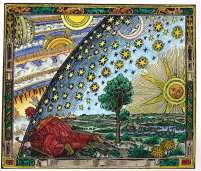This article is about what
magick means to me personally. I don't want to get too caught up in meta-physical theories about how magick works, but rather would
like to consider how one approaches it, and what practicing magick means on a personal level. And what I am writing about
here is not simply the art and science of 'spellcraft', but rather magick as a way of life - as a kind of personal religion.
I do not claim that this article is in any way a comprehensive answer to these questions, but I do believe that I have a certain
insight to offer, which may be of some use or interest to others.
I would like to begin by describing
a memory from my early childhood. I was standing in the playground of my primary school when one of the other children
asked me what my favourite colour was. The question vexed me, and this vexation persisted in one form or another for many
years. This may seem strange to you as the question appears to be a simple one, but bear with me. What vexed me was this:
I did not have a favourite colour, and more than this, I did not see why anyone should have a favourite colour. To my innocent and as yet unformed mind any one
colour seemed to be as good as any other colour, and was at a loss to find any frame of reference by which to judge their
relative values. I didn't say that of course, I said my favourite colour was blue, because I was a little boy, and little
boys like blue.
The reason why this seemingly
innocuous event caused me so much vexation was that it caused me to ask myself another, more fundamental question. It was
this second question which persisted in my mind for years to come, worrying me greatly, and it was this: 'who am I?'
I felt like I was different from the other children, and this difference was embodied in the fact that they had
a favourite colour, and I did not. I felt that there was something missing within me, or at least that the knowledge of something
within me was missing. I came to think of myself as a lost soul. That thing within me which was I was missing, that entity
which my mind searched for but could not find, that place from whence such things as favourite colours might naturally arise
of their own accord, was what I thought of as 'self'. I have since come to think of it as the 'mythical self'.
For years my mind turned inwards
upon itself, as I tried, often despairingly, to find myself. But in the end it wasn’t introspection which gave me my
answer, it was the precise opposite, it was, if you like, extrosception.
As I grew older and more mature began
to understand and empathise with other people more fully, and to think more objectively about the question which had haunted
my younger years. And what I came to realise was this: Nobody has a favourite colour until they choose one, and the choosing
is largely arbitrary. Of course there is no material reason why little boys should like blue, nor why little girls should
express a preference for pink; it is merely a convention. A convention partly imposed by adults, and partly embraced by children
themselves as they look for ways to define themselves against the immensity of the world around them.

